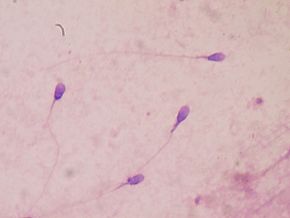 Recent research looked at environmental causes of male infertility, specifically endocrine-disrupting chemicals. Poor semen quality contributes to increases in infertility and the use of assisted reproductive technology.The researchers also discuss the higher incidence of testicular cancer worldwide, lower levels of testosterone in men, and poor semen quality among men aged 20 to 25 (with the average man having up to 90% abnormal sperm). From Science Daily:
Recent research looked at environmental causes of male infertility, specifically endocrine-disrupting chemicals. Poor semen quality contributes to increases in infertility and the use of assisted reproductive technology.The researchers also discuss the higher incidence of testicular cancer worldwide, lower levels of testosterone in men, and poor semen quality among men aged 20 to 25 (with the average man having up to 90% abnormal sperm). From Science Daily:
Endocrine-disrupting chemicals may be threatening fertility in industrialized countries
The birth rate is declining in all industrialised countries, and socioeconomic factors and women's age are not solely to blame. Male reproductive health and environmental factors are also significant, as concluded in a new scientific review article. ...Behind the article are fertility researchers from Denmark, the US and Finland. The researchers studied a number of factors related to fertility, and one of the main conclusions of their study was that poor semen quality contributed to increases in infertility and the use of assisted reproductive technology.
The study also revealed higher incidence of testicular cancer worldwide, with the greatest frequency among Caucasian populations. Moreover, the researchers also observed lower levels of testosterone in average men. "I was surprised that we found such poor semen quality among young men aged 20 to 25. The average man had up to 90% of abnormal sperm. Normally, there would be so many sperms that a few abnormal ones would not affect fertility. However, it appears that we are at a tipping point in industrialised countries where poor semen quality is so widespread that we must suspect that it results in low pregnancy rates," said first author of the article, Professor Niels E. Skakkebaek from the Department of Growth and Reproduction (EDMaRC) at Rigshospitalet and the University of Copenhagen.
"The article also demonstrates the impact of the increasing number of male reproductive problems on low birth rates. There is no doubt that environmental factors are playing a role. These are the correlations we are researching at the new research centre EDMaRC at Rigshospitalet," added Professor Anders Juul, who is the last author of the article.
Many of the male reproductive problems could be due to damage to the testes during embryonic development. While the reproductive problems could arise from genetic changes, "recent evidence suggests that most often they are related to environmental exposures of the fetal testes," the researcher team wrote."Since the disorders in male genitals have increased over a relatively short period of time, genetics alone cannot explain this development. There is no doubt that environmental factors are playing a role and that endocrine-disrupting chemicals, which have the same effect on animals, are under great suspicion. The exposure that young people are subjected to today can determine not only their own, but also their children's, ability to procreate," explained Professor Skakkebaek.
